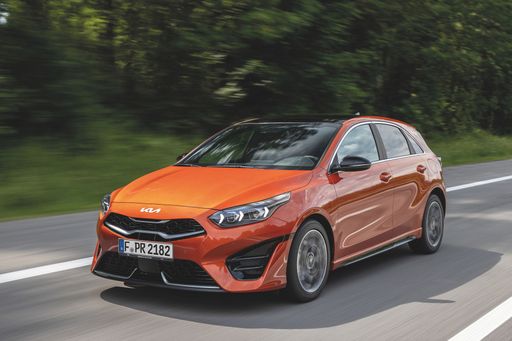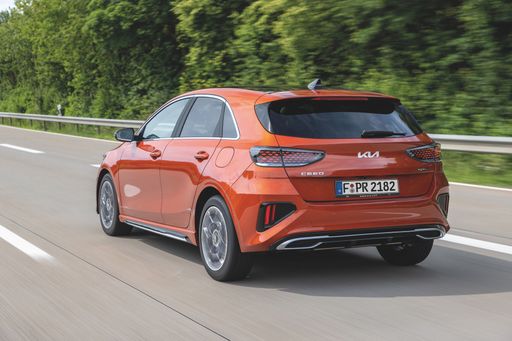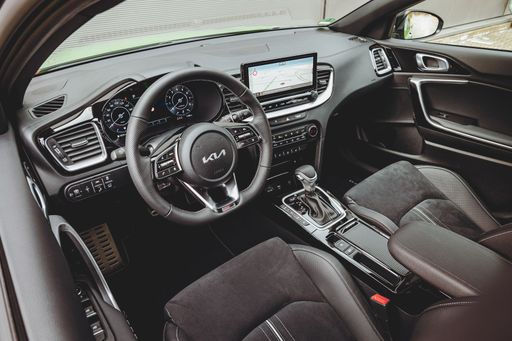Kia Ceed VS Vauxhall Vivaro – Specs, Efficiency & Price Comparison
Which model is the better choice – the Kia Ceed or the Vauxhall Vivaro? We compare performance (140 HP vs 177 HP), boot capacity (395 L vs ), efficiency (6 L vs 23.60 kWh6.60 L), and of course, the price (23100 £ vs 31000 £).
Find out now which car fits your needs better!
The Kia Ceed (Hatchback) is powered by a Petrol MHEV or Petrol engine and comes with a Automatic or Manuel transmission. In comparison, the Vauxhall Vivaro (Cargo Van) features a Diesel or Electric engine and a Manuel or Automatic gearbox.
When it comes to boot capacity, the Kia Ceed offers 395 L, while the Vauxhall Vivaro provides – depending on what matters most to you. If you’re looking for more power, you’ll need to decide whether the 140 HP of the Kia Ceed or the 177 HP of the Vauxhall Vivaro suits your needs better.
There are also differences in efficiency: 6 L vs 23.60 kWh6.60 L. In terms of price, the Kia Ceed starts at 23100 £, while the Vauxhall Vivaro is available from 31000 £.
Compare all the key specs now and find out which model fits your lifestyle best!
Kia Ceed
The Kia Ceed stands out in the compact car segment with its sleek design and impressive handling. It offers a comfortable and well-equipped interior that appeals to both drivers and passengers. With its efficient engine options, the Ceed provides a smooth and enjoyable driving experience suitable for city commutes and longer journeys alike.
details @ press.kia.com
@ press.kia.com
 @ press.kia.com
@ press.kia.com
 @ press.kia.com
@ press.kia.com
Vauxhall Vivaro
The Opel Vivaro is a versatile van that excels in both practicality and comfort, making it a popular choice for businesses and families alike. Its sleek design is complemented by a spacious interior, providing ample room for passengers or cargo. With a focus on durability and performance, this vehicle is well-suited for long journeys and demanding workloads.
details

|
|
|
|
|
Costs and Consumption |
|
|---|---|
|
Price
23100 - 31300 £
|
Price
31000 - 49400 £
|
|
Consumption L/100km
6 - 6.4 L
|
Consumption L/100km
6.6 - 7.7 L
|
|
Consumption kWh/100km
-
|
Consumption kWh/100km
23.6 - 24.8 kWh
|
|
Electric Range
-
|
Electric Range
212 - 351 km
|
|
Battery Capacity
-
|
Battery Capacity
-
|
|
co2
137 - 146 g/km
|
co2
0 - 203 g/km
|
|
Fuel tank capacity
50 L
|
Fuel tank capacity
69 - 70 L
|
Dimensions and Body |
|
|---|---|
|
Body Type
Hatchback
|
Body Type
Cargo Van
|
|
Seats
5
|
Seats
3 - 6
|
|
Doors
5
|
Doors
4
|
|
Curb weight
1298 - 1390 kg
|
Curb weight
1652 - 2188 kg
|
|
Trunk capacity
357 - 395 L
|
Trunk capacity
-
|
|
Length
4315 - 4325 mm
|
Length
4959 - 5330 mm
|
|
Width
1800 mm
|
Width
1920 - 2010 mm
|
|
Height
1442 - 1447 mm
|
Height
1890 - 1935 mm
|
|
Payload
470 - 500 kg
|
Payload
912 - 1333 kg
|
Engine and Performance |
|
|---|---|
|
Engine Type
Petrol MHEV, Petrol
|
Engine Type
Diesel, Electric
|
|
Transmission
Automatic, Manuel
|
Transmission
Manuel, Automatic
|
|
Transmission Detail
Dual-Clutch Automatic, Manual Gearbox
|
Transmission Detail
Manual Gearbox, Automatic Gearbox, Reduction Gearbox
|
|
Drive Type
Front-Wheel Drive
|
Drive Type
Front-Wheel Drive
|
|
Power HP
100 - 140 HP
|
Power HP
120 - 177 HP
|
|
Acceleration 0-100km/h
9.5 - 13.2 s
|
Acceleration 0-100km/h
10.9 - 14.3 s
|
|
Max Speed
178 - 197 km/h
|
Max Speed
130 - 185 km/h
|
|
Torque
172 - 253 Nm
|
Torque
260 - 400 Nm
|
|
Number of Cylinders
3 - 4
|
Number of Cylinders
4
|
|
Power kW
74 - 103 kW
|
Power kW
88 - 130 kW
|
|
Engine capacity
998 - 1482 cm3
|
Engine capacity
1499 - 1997 cm3
|
General |
|
|---|---|
|
Model Year
2024
|
Model Year
2024
|
|
CO2 Efficiency Class
E
|
CO2 Efficiency Class
G, F, A
|
|
Brand
Kia
|
Brand
Vauxhall
|
Kia Ceed
Discovering the Kia Ceed: A Symbol of Modernity
In the dynamic world of automotive engineering, Kia has consistently stood out with its innovative and reliable models. The Kia Ceed is no exception, bringing a blend of efficiency, style, and cutting-edge technology to the table. Let's delve into the details of this eye-catching hatchback and uncover what makes it an alluring choice for modern drivers.
Power and Performance: Under the Hood
The Kia Ceed is equipped with an impressive range of powertrains, offering a selection between petrol engines and mild-hybrid technology. The engine lineup boasts power outputs from 100 to 140 PS, catering to both economical driving needs and those seeking a bit more thrill on the road. The engine choices are complemented by either a smooth manual transmission or a state-of-the-art dual-clutch automatic, ensuring an engaging driving experience tailored to individual preferences.
Efficient and Eco-Friendly Engineering
Kia's dedication to eco-friendliness is evident in the Ceed's engineering, offering remarkable fuel efficiency between 6 to 6.4 L/100km. This focus not only keeps running costs low but also helps reduce emissions, maintaining a responsible footprint with CO2 emissions ranging from 137 to 146 g/km. This efficient performance ensures the Kia Ceed is both a financially savvy and environmentally considerate choice.
Advanced Technologies and Safety Features
Innovation is at the heart of the Kia Ceed's design, with a suite of advanced technological features enhancing comfort and safety. The latest driver-assist systems help keep occupants secure, providing confidence on every journey. Lane Keeping Assist, Forward Collision Warning, and Intelligent Speed Limit Assist are just some of the high-tech features that work seamlessly in the background, making driving both safer and more relaxed.
Styling and Comfort: A Perfect Cabin Space
Stepping into the Kia Ceed, drivers and passengers are greeted by a sophisticated interior, designed for comfort and style. Seen in multiple variants including the Nightline Edition and GT Line, the Ceed offers a premium feel across all its models. With dimensions that promise ample space—stretching up to 4325 mm in length and offering a boot capacity between 357 to 395 L—the Ceed perfectly accommodates both daily commutes and adventurous getaways.
Value for Money: A Wise Investment
Balancing a competitive initial outlay, ranging from €25,590 to €35,090, with low running costs, the Kia Ceed redefines value for money. This hatchback's adaptability to various lifestyle needs, paired with monthly costs from €887 to €1,019, positions it as a wise investment in the current automotive market.
Conclusion: The Kia Ceed in a Nutshell
The 2024 Kia Ceed superbly combines power, efficiency, and cutting-edge innovations, making it a noteworthy contender in the hatchback segment. Whether it’s the eco-friendly credentials, advanced safety systems, or the blend of practicality and style, the Kia Ceed is primed to lead the way in the evolving era of modern vehicles.
Vauxhall Vivaro
Introducing the Opel Vivaro: Versatile & Efficient Transport Companion
The Opel Vivaro, a popular choice among transport professionals, combines practicality with innovative technology. As a versatile vehicle designed for utility and efficiency, the Vivaro aligns with the needs of businesses and individuals looking for reliable transport solutions.
Performance & Powertrain Options
The Opel Vivaro offers a variety of engine configurations, ranging from economical diesel variants to cutting-edge electric options. The diesel engines, available with power outputs between 120 and 177 PS, feature either a manual or automatic transmission and are built for both performance and economy, showcasing a fuel consumption range of 6.6 to 7.7 L/100km.
For those seeking a more sustainable option, the electric version of the Vivaro provides an impressive range of 212 to 351 km on a single charge, with energy consumption between 23.6 and 24.8 kWh/100km, making it an environmentally-friendly choice for businesses looking to reduce their carbon footprint.
Interior & Comfort
Inside the Vivaro, comfort meets practicality. With seating for up to six passengers, the vehicle offers a spacious cabin equipped with modern amenities. The layout is designed to enhance driver comfort and reduce fatigue on longer journeys, which is especially beneficial for delivery drivers and professionals consistently on the road.
Innovative Technology
Opel has integrated advanced technological features into the Vivaro, optimising both the driving experience and safety. Driver assistance technologies, such as adaptive cruise control and lane assist, enhance safety by supporting the driver in various situations. Additionally, the Vivaro includes a range of infotainment options to ensure connectivity and entertainment on the go.
Practicality & Load Capacity
The Opel Vivaro is a transporter by design, and its cargo capacity aligns with this purpose. Offering a sizeable cargo area, with a length ranging from 4959 to 5309 mm, the Vivaro supports a payload capacity between 912 and 1333 kg, making it ideal for businesses that require extensive space for goods and equipment.
Economy & Environmental Considerations
Each engine option in the Vivaro line-up is designed with economy in mind. The diesel variants are equipped with fuel-saving technologies, while the electric models contribute to zero emissions during operation, earning top marks in CO2 efficiency. Efficient fuel and energy consumption ratings enhance both the economic and environmental appeal of the Vivaro.
Conclusion
The Opel Vivaro stands out as a robust and versatile vehicle for businesses, offering a balance of power, efficiency, and advanced technology. Whether selecting from the reliable diesel models or the innovative electric versions, the Vivaro meets the demands of modern transport with style and substance, making it a valuable asset for any fleet.
The prices and data displayed are estimates based on German list prices and may vary by country. This information is not legally binding.
